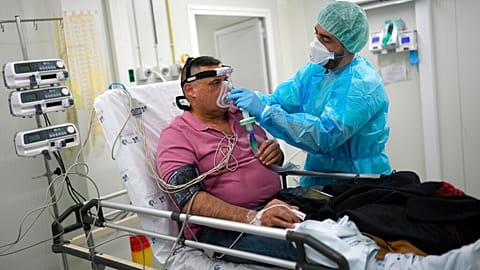Italy is set to finalise a decision that would make the birth control pill free for women of all ages across the country, but it's sparked outrage from some groups.
Italy is set to make contraception medication available for free to women of all ages, a move that’s been celebrated by women’s rights activists nationwide and condemned by anti-abortion advocates.
The decision was made by the Pricing and Reimbursement Committee (CPR) of AIFA, the Italian Medicines Agency, and it’s now pending approval from the agency’s board of directors before coming into force.
At the moment, women in Italy have to pay for birth control pills, which range in cost from €9 to €24 depending on the brand.
In a handful of Italian regions – including Lazio, Puglia, Piemonte, Tuscany, and Emilia Romagna – birth control pills are already entirely reimbursable, although with age restrictions which often excluded women above the age of 21 or 26.
Making birth control medication free to all women in the country is a move that AIFA estimates will cost Italy €140 million every year. But despite the cost, AIFA’s Giovanna Scroccaro told local news media that “it was an important decision” which will allow a potential growth in the number of women who use the pill, which has historically been quite low in the country.
Access to contraception was granted under Italian law in 1971 after a long battle for the recognition of women and civil rights in the country.
Protests from anti-abortion and pro-life groups
According to data from AIFA, an estimated 2.5 million women in Italy currently use the pill -- either as a contraceptive or to address issues like hormonal imbalance, cramps, and painful periods. According to the agency, Italy doesn’t have a tradition of planned parenthood and it lags behind most European countries in the number of women who use birth control pills and other contraceptives.
But the much-awaited decision from AIFA sparked loud protests from anti-abortion and pro-life groups in the country.
Pro Vita & Famiglia, an Italian anti-abortion group, commented on the move, warning of the alleged dangers of the birth control pill for women’s health.
“There is nothing more dangerous for women’s health than trivialising issues that impact them directly, such as abortion, contraception, gender and prostitution”, said Pro Vita & Famiglia board member Maria Rachele Ruiu.
“The resources used could have been allocated to alleviate the serious conditions of families with disabled children who need very expensive drugs that are not provided free of charge”, said Massimo Gandolfini, leader of anti-abortion group Family Day.
But just as many have spoken out in favour of the AIFA’s decision – even beyond women’s rights activists.
Researcher Alessandra Kustermann, former director of gynaecology at the Mangiagalli Centre of the hospital Policlinico di Milano, celebrated the AIFA’s move, calling the decision to make the birth control pill free “a good message for young women” in Italy.
“First, it tells them that the birth control pill is a safe medication, with fewer side effects than an unwanted pregnancy. The health of a woman is more at risk with an abortion or maternity,” she told Corriere della Sera.
“It’s a free choice, not an imposition. The important thing is for women to know this is available and be free to decide for themselves. At the moment, the most common contraception method among young people is ‘coitus interruptus’, which is also the riskiest. There’s a 14% chance of failure, while condoms work 90% of the time and the pill 99%, but it’s used way less.”
One step forward, two steps back
Italy often seems to make one step forward and two steps back in its approach to women’s health issues, as it battles rival groups pushing for opposing goals.
For example, despite abortion being a right enshrined into law since 1978, access to the actual procedure is still difficult in the country, with seven in 10 gynaecologists identifying as “conscientious objectors,” according to Italy’s Ministry of Health, and refusing to conduct abortions – an option allowed under the country’s legislation.
Anti-abortion groups in Italy have recently doubled down in their attacks against the procedure, galvanised in part by the success that similar Republican-led efforts are reaping in the US. Giorgia Meloni’s right-wing government has looked admiringly at these groups, pushing legislation that would limit the country’s abortion rights.
Last year, Italian senator Maurizio Gasparri of Silvio Berlusconi’s Forza Italia party proposed an amendment to Italy’s civil code that would recognise a foetus as a human being, which would classify abortion as murder.
Italy’s right-wing government, which has taken a strong stance in defence of the traditional family since Meloni’s campaign for election and in support of increasing natality in the country, has already spoken against AIFA’s decision.
Lavinia Mennuni, a Brother of Italy senator, called on the agency to “take a step back” and focus instead on pregnancy and family support, adding that the decision of making the birth control pill available should be up to the government.


















